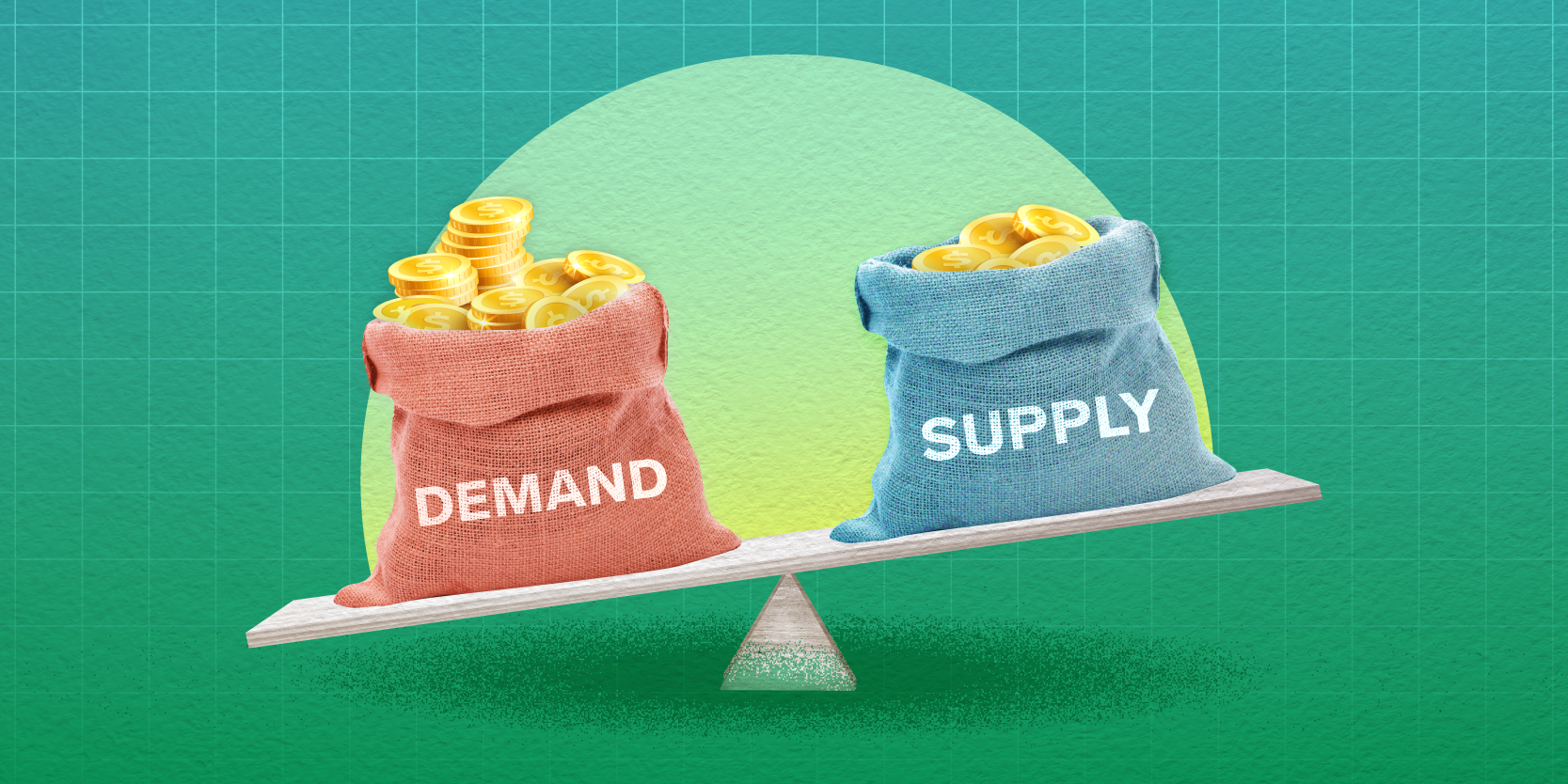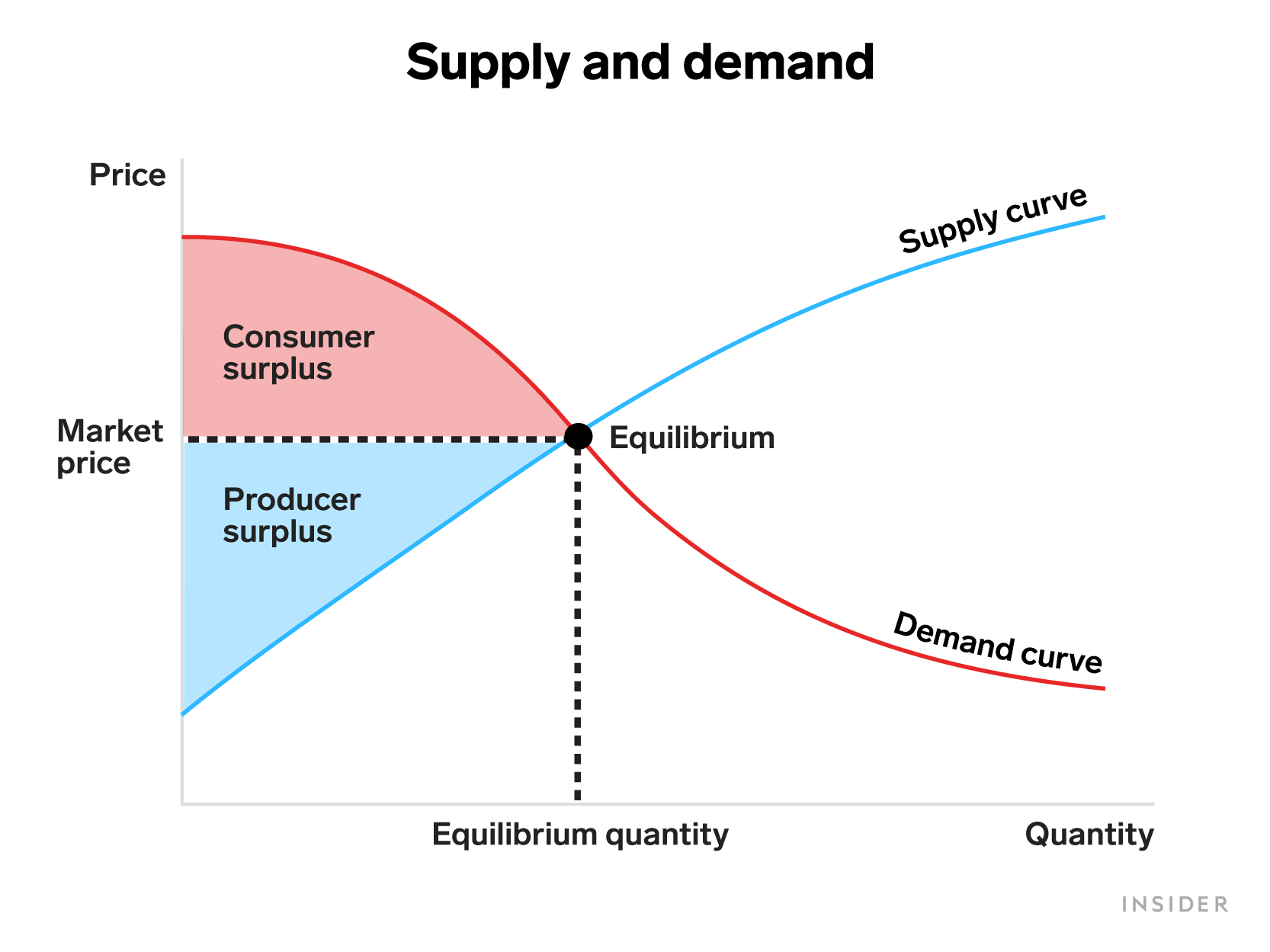
Rachel Mendelson/Insider
- Surplus refers to an excess of production or supply over demand.
- Economic surplus is made of two parts, consumer surplus and producer surplus, and is a measure of market wellbeing.
- Certain factors, such as over or underproduction and taxes, can affect economic surplus and market efficiency.
- Visit Insider's Investing Reference library for more stories.
The term "surplus" typically refers to having more of something than is actually needed or used. But what surplus actually means can vary quite a bit depending on different contexts. For example, a budget surplus is when the government takes in a higher amount of tax revenue than it spends. Since it has money left over, there's a budget surplus.
But a surplus isn't always a good thing. In relation to business, a surplus inventory can mean having excess inventory sitting in stock due to lack of demand. There's also economic surplus, which refers to the sum total of two parts – consumer surplus and producer surplus – and reflects the surplus each party takes advantage of in a particular economic activity. Though there are various types of surplus with different definitions, we'll be focusing primarily on economic surplus.
Understanding how economic surplus works
Economic surplus refers to the respective gains that a consumer or producer gets within an economic activity and is the combined benefit, sometimes referred to as "total welfare." It can also be referred to as total surplus or community surplus as well.
This economic metric is used to evaluate wellness in the markets. When a consumer scores an item for less than they'd be willing to pay, the consumer is getting a surplus. When a producer sells a good for more than the minimum price they're willing to sell at, the producer is getting a surplus.
Economic surplus follows the rules of supply and demand. Businesses generally want to earn as much profits as possible without alienating customers, while consumers typically want to feel as though they're scoring a deal.
When the supply and demand of consumers and producers are in good shape, the market is in what is called "equilibrium" - or allocative efficiency.
"In a competitive market, the market is in equilibrium when the price of a good or service is such that the total quantity of that good or service that buyers are willing and able to buy is exactly equal to the total quantity that sellers are willing and able to sell," explains Dr. Zoë Plakias, assistant professor at the Department of Agricultural, Environmental, and Development Economics at The Ohio State University. "At the equilibrium price and quantity in a perfectly competitive market, total surplus, which is the sum of consumer surplus and producer surplus, is maximized. When surplus is maximized in a market, we say that market is efficient."
Equilibrium price refers to the price where the goals of the consumers and producers match. In other words, it's the price that consumers are willing to buy at and the producers are willing to sell at. Equilibrium quantity signifies the exact amount of a particular good where supply and demand meet.
What are the different types of economic surplus?
Economic surplus has two parts to it: consumer surplus and producer surplus. These two types of surplus differ but both represent a particular gain for either the consumer or producer.

Consumer surplus
A consumer surplus refers to the monetary benefit that a consumer receives when purchasing a good for a lower price than the top amount they'd be willing to pay in that scenario. The consumer surplus refers to the marginal benefit - or the highest price they'd pay - minus what they actually paid.
Producer surplus
Producer surplus refers to the monetary gain that producers get by selling a particular good above the lowest price that they'd be willing to sell at. The marginal cost refers to the incremental costs that a producer has when producing more of a particular good.
When there is "equilibrium" among both consumer surplus and producer surplus both the marginal benefit as well as the marginal cost are the same value.
What causes an economic surplus?
As mentioned before, the concept of economic surplus is closely tied to supply and demand. In other words, how much is available of a particular good and what is the demand for it?
The law of supply and demand is inherently related to consumers and producers, the two parts that make up economic surplus. The law of supply suggests that as the price of a particular good increases, so does the amount or supply of it as well. The converse is true as well in that when the price decreases, so does the supply.
The law of demand suggests that as the price for a particular item increases, the demand falls. In other words, as something increases in cost, there are fewer consumers in the market willing to pay for it. The converse is true as well, so that if the price falls, the demand increases.
The primary cause of an economic surplus is when the supply and demand for a particular good is out of sync. This disrupts market equilibrium, which can lead to shifts in the price of a particular good or the quantity made.
Certain factors that can affect economic surplus and market efficiency include:
- Overproduction, or having too much of a particular item produced.
- Underproduction, or having too little of a particular item created.
- Taxes, as it can lead to higher prices for consumers and lower production for suppliers.
- High transaction costs, which can be prohibitive to both consumers and producers.
"These surpluses are caused by a mismatch between supply and demand. If there are too many TVs in stock then vendors will likely have to reduce prices, even selling them at a loss to reduce inventory," explains Tsang. "But if those same TVs are in low supply and demand remains the same or even rises, then they can sell them for more than we'd typically be willing to pay."
The financial takeaway
Surplus can refer to many things but economic surplus is used to evaluate market conditions and benefits for both consumers and producers. But it represents a small part of something much bigger.
"This idea of surplus only captures the costs and benefits of production and consumption that fall onto buyers and sellers," notes Plakias. "For example, if there are any costs or benefits borne by others external to the market, or if the market is not perfectly competitive, then without any intervention the price and quantity we observe in the market are generally not efficient and we likely want to address that as a society."
In that case, the government may play a role in market conditions. When evaluating economic surplus. It's important to note that it's not the whole picture.
Plakias notes that, "The total surplus tells us nothing about equity and the distribution of benefits across people in the economy, which we care about as a society and likely want to factor into our decisions."
